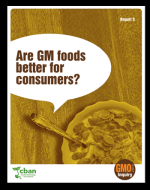29.09.2015 | permalink
88 per cent of Canadians want GMO foods labeled

New Poll Shows Canadians are Highly Concerned About GM Foods and Want Mandatory Labelling
September 29, 2015.
Ottawa, ON. A national Ipsos Reid poll commissioned by the Canadian Biotechnology Action Network (CBAN) reveals 88 per cent of Canadians want genetically modified (GM) foods labeled on grocery store shelves. Of the over 1000 Canadians polled, over half oppose genetically modifying crops and animals to produce food.
“Our poll shows that Canadians have a range of concerns about genetically modified foods,” said Lucy Sharratt of CBAN. “The vast majority of Canadians who want labelling just want to know what’s in the food they’re eating. Canadians are also concerned about safety, the environmental impacts and some have ethical concerns about genetically modifying plants and animals.”
Since the first GM foods were approved for sale in Canada twenty years ago, polls have consistently shown that the overwhelming majority of Canadians want mandatory labelling.
The new poll comes as the world’s first GM food animal – a GM Atlantic salmon – is pending approval from Health Canada. “45 per cent of Canadians polled said they definitely don’t want to eat the GM fish, but without labelling how can they make this choice?” asked Thibault Rehn of Vigilance OGM.
- Canadian Biotechnology Action Network - CBAN: New Poll Shows Canadians are Highly Concerned About GM Foods and Want Mandatory Labelling
- GMO Inquiry 2015: Are GM foods better for consumers?
- Common Ground: GM crops wreak havoc with ecosystems and health
- GMO FREE EUROPE 2015: Canada: Impacts and Lessons from 20 Years of GMOs
24.09.2015 | permalink
2 more EU countries, Austria and Italy say they will opt out from GMO cultivation
Tweet by Arnaud Apoteker
https://twitter.com/ArnaudApoteker
@ArnaudApoteker
No a 8 prodotti Ogm, l’Italia contro l’Ue
http://www.testmagazine.it/2015/09/18/no-a-8-prodotti-ogm-litalia-contro-lue/2714/
Gentechnik: Oberhauser nützt "Opt-Out" für Anbauverbot
http://www.bmg.gv.at/home/Startseite/aktuelle_Meldungen/Gentechnik_Oberhauser_nuetzt_Opt_Out_fuer_Anbauverbot
---
Member States/Regions wishing to use the transitional arrangements to opt out of growing EU approved GM maize MON 810 or any of the GM maize varieties currently awaiting EU approval must notify the European Commission by October 2, 2015.
http://news.scotland.gov.uk/News/GM-crop-ban-1bd2.aspx
23.09.2015 | permalink
Climate Smart Agriculture must not be confused with agroecology
DON'T BE FOOLED!
CIVIL SOCIETY SAYS NO TO “CLIMATE SMART AGRICULTURE” AND URGES DECISION-MAKERS TO SUPPORT AGROECOLOGY
SEPTEMBER 2015
We, the undersigned, belong to civil society organizations including social movements, peasants/farmers organizations and faith-based organizations from around the world. We are working to tackle the impacts of climate change that are already disrupting farming and food systems and threatening the food and nutrition security of millions of individuals. As we move towards COP21 in Paris, we welcome a growing recognition of the urgent need to adapt food systems to a changing climate, and the key role of agroecology within a food and seed sovereignty framework in achieving this, while contributing to mitigation through the reduction of greenhouse gas emissions.
However, despite these promising signals, we share deep concerns about the growing influence and agenda of so-called “Climate-Smart Agriculture” (CSA) and the Global Alliance for Climate-Smart Agriculture (GACSA). Climate change is the biggest and the most urgent threat our societies face. We need a radical transformation of our food systems away from an industrial model and its false solutions, and toward food sovereignty, local food systems, and integral agrarian reform in order to achieve the full realization of the human right to adequate food and nutrition. We therefore urge decision-makers at country and UN levels to reject the dangerous rhetoric of Climate-Smart Agriculture.
Climate Smart Agriculture must not be confused with agroecology
22.09.2015 | permalink
Spread of genetically engineered organisms out of control
New report on recent and emerging cases
Monday, 21. September 2015
Testbiotech will publish a report providing a global overview of recent cases of uncontrolled spread of genetically engineered organisms able to persist and propagate in the environment. The report will be presented to a working group organised by the Secretary of the Convention of Biological Diversity (CBD) at a meeting taking place in Montreal (Canada) from 21 - 25 September.
The evidence presented in this report comes from China (rice), Mexico (maize and cotton), Japan (oilseed rape) South Korea (maize and cotton), Switzerland (oilseed rape) and the USA (grasses). Further emerging examples are likely to include eggplant (India / Bangladesh), trees such as pine and eucalyptus in North and South America and genetically engineered insects (Brazil and Panama).
22.09.2015 | permalink
Banning GM crops - A growing number of governments across Europe have taking step to protect public health and biodiversity
News that Northern Ireland will follow Scotland in banning GM crops under new EU rules has been welcomed by the SNP. Northern Ireland’s Environment Minister, Mark Durkan, has taken the decision to ban the cultivation of GM crops citing the need to protect the environment and Northern Ireland’s green reputation.
This follows the decision last week of France and last month of Germany, to use the same EU rules to ban GM crops. The Scottish Government took the decision in August to restate its precautionary approach to the cultivation of GM crops in Scotland to protect Scotland’s clean, green status.
21.09.2015 | permalink
4 GM crops are currently grown in Canada
It's been 20 years since genetically engineered (GE; also called genetically modified or GM) crops and foods were first introduced into Canada.
Only 4 GE crops are currently grown in Canada:
canola
corn
soy
sugar beet (white sugar beet for sugar processing)
These 4 crops end up on our grocery store shelves as processed food ingredients and are also widely used for animal feed and to make biofuels. These crops are engineered to be either insect resistant or herbicide tolerant, and many now carry both traits.
We could also be importing a small amount of:
5. GE papaya (from Hawaii)
6. GE squash - some varieties of yellow crookneck squash (from the US)
7. GE cottonseed oil
8. milk products from the US made with the use of recombinant Bovine Growth Hormone
- Canadian Biotechnology Action Network - CBAN: Canada: GE Crops and Foods (On the Market)
- Canadian Biotechnology Action Network: GMO Inquiry 2015
- Canadian Biotechnology Action Network - CBAN: Election 2015 / What is Party Policy on GMOs?
- Canadian Food Studies / La Revue canadienne des études sur l'alimentation
21.09.2015 | permalink
EFSA to publish conclusions on glyphosate by end year
The European Food Safety Authority is to publish its conclusions on glyphosate use in the next few months and will take into account the International Agency for Research on Cancer (IARC) study on the active ingredient, The Malta Independent on Sunday has learnt.
The IARC is a branch of the World Health Organisation.
The EFSA plays a key role in the peer review of the pesticide risk assessment. According to Maltese MEP Roberta Metsola, who confirmed with this newsroom that EFSA is looking into a possible renewal of this active substance, the European Commission will only take a stand on this issue when EFSA completes its review on IARC’s assessment.
Sales of the herbicide produced by Monsanto must stop in December if not given re-authorisation. The Commission proposed to extend marketing to June of next year.
18.09.2015 | permalink
France bolsters ban on genetically modified crops
France is to use a new European opt-out scheme to ensure a ban on the cultivation of genetically modified crops in the country remains in place, it said on Thursday.
The European Union's largest grain grower and exporter has asked the European Commission for France to be excluded from some GM maize crop cultivation under the new scheme, the farm and environment ministries said in a joint statement.
As part of the opt-out process, France also passed legislation in the National Assembly that would enable it to oppose the cultivation of GM crops, even if approved at EU level, on the basis of certain criteria including environment and farm policy, land use, economicimpact or civil order, the environment ministry added.
Widely grown in the Americas and Asia, GM crops have divided opinion in Europe. France had already banned cultivation of U.S. group Monsanto's GM maize, saying it had serious doubts that it is safe for the environment.
17.09.2015 | permalink
Enough data to cast doubt on the safety of glyphosate, the precautionary principle should be applied
Vote against taking glyphosate off the market “disgraceful”
A small majority of the European Parliament's Environment and Public Health (ENVI) committee on 15 September blocked a proposal by GUE/NGL to take glyphosate off the market by the end of 2015.
The GUE/NGL had drafted and proposed, together with other MEPs from across the Parliament, an objection based on Rule 106 on the ' Extension of the approval period of the active substance glyphosate.' The outcome of the vote, which was a nominal vote, was disappointing and surprisingly, some members of the Parliament's Green group were among the blocking majority.
- GUE/NGL: Vote against taking glyphosate off the market "disgraceful"
- European Parliament: Draft motion for a resolution on the objection pursuant to Rule 106: Extension of the approval period of the active substance glyphosate
- ARC2020: Europe starts taking glyphosate off shelves
- Chemistry World: Glyphosate to be labelled a carcinogen in California
16.09.2015 | permalink
South Africa: Consumer Victory - GM Potatoes Rejected

Appeal Board rejects GM potatoes for South Africa
The African Centre for Biodiversity (ACB) welcomes the recent decision made by the Minister of Agriculture, Water Affairs and Fisheries and an Appeal Board rejecting the commercialisation of genetically modified (GM) potatoes in South Africa.
The ACB with the support of the South African public, vigorously campaigned over a number of years against the Agricultural Research Council (ARC’s) bid to bring GM potatoes, also known as “SpuntaG2,” to the South African market. The potatoes were genetically engineered to produce a toxin to kill the potato tuber moth. The ACB has always contended that the GM potato posed unacceptable risks to human and animal health, the environment and the farming community. GM Regulators in SA, the Executive Council: GMO Act, agreed and rejected ARC’s application in 2009, citing a long list of biosafety, health and socio-economic concerns. These were challenged by the ARC in an appeal, which they have now definitively lost.



